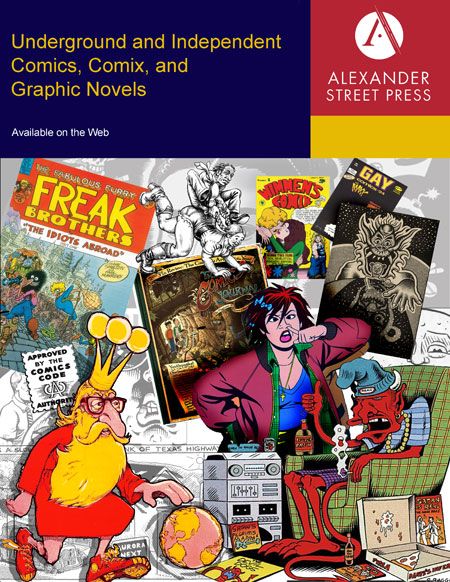Fantagraphics announced last week it has formed a partnership with Alexander Street Press to include a complete run of The Comics Journal as part of the Underground and Independent Comics, Comix, and Graphic Novels online archive. Not knowing much about Alexander or the archive, I contacted Fantagraphics Co-Publisher Gary Groth to get some more information.
Robot 6: For the uninitiated, can you explain what Alexander Street Press is and what purpose they serve in the academic community?
Gary Groth: I'm by no means an expert on Alexander Street Press, but my understanding is that they provide searchable digital databases to academic institutions composed of classics works in a variety of disciplines — such as film, theater, literature, etc. These are provided primarily for scholarly use. I was able to go into some of their databases and poke around and they're truly remarkable. You can search for subjects, themes, proper names, historic events, key words, etc.
How did this partnership come about? Did they contact you or vice versa?
They approached us.
Can you talk about how you feel this partnership will benefit academics and scholars?
The magazine is a journalistic repository that comprises the history of comics from the year I co-founded it, 1976, to present, though the first 25 pre-Internet years are probably the most valuable; so, depending upon how valuable you think those 274 issues of The Comics Journal are, this will allow academics and students access to every one of those issues. There are literally tens of thousands of pages comprising interviews with hundreds of creators (many of whom have sadly died), reviews and criticism, investigative journalism, and debate about issues that consumed us throughout those years. Apart from all the individual contributions, in the whole-is-greater-than-the-sum-of-its-parts department, it entire run comprises something of an informal history of comics over that period.
Not to be stupid, but how exactly does this work? Is this an existing catalog, which online version of the Journal will be added to and subscribers can then peruse? Once you've subscribed, how do you access the material?
As I understand it, these are available at universities and it works the same way as a University library, i.e., you have to have some connection to the University in order to access it. So, you, as a consumer, don't subscribe; the University subscribes to it and makes it accessible to its students, faculty, etc; essentially, it's a digital library and works the same way as their physical library.
Just to be clear: This will contain the complete run of The Comics Journal, special editions and new phone book-sized #301 included?
Yes. I believe it's a part of a larger package, though, that subsumes underground and alternative comics as well. I also helped Alexander Street Press compile lists of such artists (many of whom we published, of course) and contact them. (They had several other consultants as well.) So, the digital library itself contains every issue of the Journal as well as tens of thousands (maybe hundreds of thousands) of pages of underground and alternative comics.
Are these going to be basic scans of the magazine similar to what's currently found on the TCJ site?
Yes, exactly.
When does this take effect? Is it already up and running?
Up and running and already available at certain universities.
I also heard from Greg Urquhart, vice president for business development and editor for comics and graphic novels at Alexander Stret Press, who sent the following background information:
Alexander Street Press is a publisher of online multimedia collections specifically for academia. We sell access to our collections to university libraries, who then provide access to that university's students and faculty. We are particularly well-known for our thorough indexing and advanced searching/browsing tools that are particularly useful in an academic setting. For example, in our comics collection it's possible to search on such things as the gender, race, and sexual orientation (where relevant/known) of artists, writers, and even characters.
Our comics collection is called Underground and Independent Comics, Comix, and Graphic Novels. The idea was to create a unique resource for comics studies, and a digital archive of materials that academic libraries had previously overlooked-- materials that were of tremendous importance and relevance to the continued evolution of the comics form. It currently contains more than 100,000 pages of materials and is still growing.
The collection contains both primary materials (the comics themselves) and secondary materials (stuff about comics) such as The Comics Journal. We index everything thoroughly to allow for the kinds of detailed searches that are essential to academia. We've also re-keyed The Comics Journal so that it is fully text-searchable.
From the first conception of the collection, I knew I wanted to include The Comics Journal. It is unique among comics publications for the longevity and continuity of its run, and also for its unique mix of independent reporting, criticism, and interviews. It's one thing to read Slutburger, for example, and another thing to be able to read Slutburger and immediately see contemporaneous interviews with Mary Fleener and reviews of the work from the pages of The Comics Journal. This type of context is invaluable.
The reaction in the academic and library communities to Underground and Independent Comics, Comix, and Graphic Novels has been phenomenal. It is currently available at more than 85 universities around the world, from Asia and Europe to the US and Canada. The Library Journal also named it as the top digital art-reference resource of 2011.
According to this review of the archive by the Library Journal, the archive costs anywhere between $12,500–$50,000 for an outright purchase (with additional annual access fees), or $800–$4300 for an annual subscription. That obviously puts it out of the range of individuals but within the reach of most academic institutions. I was able to get temporary access to the archive from the kind folks at Alexander Street Press and I hope to offer a considered review of it later this week.


